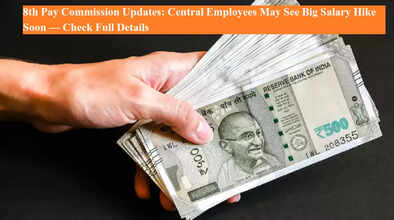8th Pay Commission Updates: Central Employees May See Big Salary Hike Soon — Check Full Details

The Central Government’s 8th Pay Commission (8th CPC) has become one of the most awaited announcements for nearly 50 lakh central government employees and 65 lakh pensioners across India. The new pay panel is expected to bring significant revisions in salaries, allowances, and pension structures, offering major financial relief to millions of government workers.
Formation of the 8th Pay Commission
The government had officially announced the formation of the 8th Pay Commission in January 2025, but the Terms of Reference (ToR) and the names of commission members are yet to be finalized. As per previous trends, a new pay commission is generally formed every 10 years to review and recommend changes in the pay structure of central government employees.
The 7th Pay Commission was established in 2014 and implemented from January 1, 2016, leading to an average 23% increase in salaries. Before that, the 6th Pay Commission, which came into effect in January 2006, resulted in a 40% rise in pay for government employees.
When Will the 8th Pay Commission Be Implemented?
Going by historical timelines, recommendations of a newly constituted pay commission generally take around two years to be implemented. Since the 8th CPC has not been formally constituted yet, reports suggest its recommendations could come into effect by 2028.
However, according to a recent report by Kotak Institutional Equities, the 8th Pay Commission’s implementation might be fast-tracked. The report indicates that the recommendations could be rolled out by late 2026 or early 2027, depending on the government’s approval timeline and pre-election budgetary priorities.
Government’s Current Preparations
In July 2025, the Ministry of Finance informed Parliament that preliminary work toward setting up the commission has already begun. The ministry has initiated consultations with various key departments such as the Department of Personnel and Training (DoPT), Ministry of Home Affairs, Ministry of Defence, and several state governments to finalize parameters for the new pay structure.
The primary goal of this exercise is to design a more performance-based and inflation-adjusted salary structure, ensuring long-term sustainability of government pay scales without excessive pressure on fiscal resources.
Expected Salary Hike Under 8th CPC
As per multiple reports, the fitment factor, which determines the multiplication rate applied to the existing basic pay, may see a notable revision this time.
-
Under the 7th Pay Commission, the fitment factor was 2.57x, which led to substantial pay hikes across all categories.
-
For the 8th Pay Commission, it is expected to be increased by 1.8 times, meaning the effective multiplication factor could reach 4.37x overall (2.57 × 1.8).
If implemented, the minimum basic salary of central government employees, currently at ₹18,000 per month, could rise to around ₹30,000 per month or more, depending on the final formula approved by the government.
Benefits Beyond Salary
Apart from direct salary hikes, the 8th Pay Commission is also expected to review allowances, including Dearness Allowance (DA), House Rent Allowance (HRA), and Transport Allowance (TA), aligning them with current inflation and cost-of-living conditions. Pensioners are also likely to benefit from revised pension structures and improved gratuity rules, ensuring better post-retirement stability.
Final Outlook
While the official notification is still awaited, the momentum around the 8th Pay Commission is clearly building. With rising living costs and growing inflation concerns, the government faces increasing pressure from employee unions to expedite the process.
If implemented within the expected timeframe, the 8th Pay Commission could deliver a major financial boost to government employees and retirees alike, enhancing disposable income and improving purchasing power — a move that could also stimulate overall economic growth.

